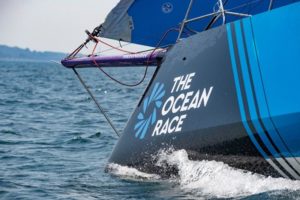
This Events Guide is a tool for event planners to make their events more sustainable.
You will find tips for sustainable practices during your event, including what to do throughout the planning process (before, during and after the event) and small things to remember like paperless invites, sustainable food vendors and clearly marked waste bins. This guide is the result of many event planning staff across UW and is sure to keep growing so please do come back soon and often.



Outdoor Sport in Extreme Heat: Capturing the Personal Experiences of Elite Athletes
Details
Heat stress from the environment can be detrimental to athletes’ health and performance.
No research, however, has explored how elite athletes conceptualize and experience heatwaves and climate change. Utilizing a qualitative approach, this study examined elite athletes’ perceptions, experiences, and responses to extreme heat in relation to climate change and explored the use of their platforms for climate activism.
Fourteen elite athletes from the United Kingdom, Australia, the United States, Sweden, and Canada, who represented 10 different sports including race walking, netball, and cricket were recruited using snowball sampling. Data were collected using semistructured interviews.
Thematic analysis revealed four broad themes. The first theme reflected uncertainty surrounding the causes of heatwaves and the impact of heat on athlete health and performance. The second theme reflected care and concern for sport and society, including concern for the well-being of athletes and spectators, the impact of heat on facilities and participation at the grassroots level, and how the nature of sport may change in the future.
The third theme referred to the implications of heatwave experience on athlete health and performance, and how experience affected individual and organizational preparedness. The fourth theme referred to enablers and barriers to successful climate change communication.
This study contributes to the sport ecology literature by introducing the subjective heat experiences of elite athletes. Educating athletes and event organizers about the impacts of heat on sport participation is imperative to increase awareness and, it is hoped, to limit illness for those training and competing.
Click here to read the full study




Nature is at the heart of what we do -the race-track we compete on and the wind that powers our boats - but it is deteriorating fast.
We’re harnessing the ambition of the Race to be a force for change and drive the protection and restoration of our seas. We want an ocean that is healthy and full of life. This ultimately benefits nature and us all.
We aim to drastically reduce our plastic footprint and commit to collecting separately, measuring,
reporting and balancing any unavoidable single-use plastic through investing in social plastic offsets.
This guide has been produced to share our knowledge and learnings on how to reduce single use plastic at sporting events (well - at all events!)
We hope it inspires you to take action to turn the tide on plastic at your event.
Meegan Jones
Sustainability Programme Advisor
The Ocean Race





We have today launched a new five-year sustainability strategy, setting out our plan to make a positive impact on the environment and the communities in which we serve.
The new strategy, titled ‘Playing for the Future’, will drive forward our environmental ambitions until 2028, and will ensure that we continue to be a role model in shaping a positive football future for all.
The strategy has been created through extensive consultation with a wide range of football stakeholders and environmental experts, and focuses on three core areas:
- SHOOT FOR NET ZERO – fight climate change and reduce emissions
• Achieve net zero status by 2040
• Invest over £35m to deliver the 2040 ambition
• Work towards reducing CO2e emissions 50% by 2030 from a 2019 baseline, reducing electricity consumption by 30% by 2028 from a 2019 baseline, and reducing gas consumption by 20% by 2028 from a 2019 baseline
- SAVE OUR RESOURCES – optimise resource consumption
• Reduce resource consumption across Wembley Stadium and St. George’s Park, and embed more sustainable practices across the organisation
• Minimise impact of waste through procurement choices, avoiding waste, identifying reuse opportunities and maximising recyclability
• Reduce water consumption by 30% by 2028 from a 2019 baseline
• Protect biodiversity across all FA venues – animals, wildlife, plants, micro-organisms
- MAKE AN IMPACT – deliver and govern change across football
• As the governing body of English football, The FA is in a unique position to drive wider environmental and societal change across clubs, leagues, and with partners
• The FA will create the operational framework to embed this strategy across the whole organisation, including its facilities, and increase awareness and environmental sustainability practices across football, whilst governing and supporting wider change
• The strategy will also ensure FA partners are aligned and committed to the sustainability ambitions
The launch of this new sustainability strategy builds on the extensive work across Wembley Stadium and St. George’s Park to drive operational sustainability efforts, particularly around waste, food and energy. The strategy will be reviewed every two years and further updates will be provided in due course.
Mark Bullingham, The FA’s Chief Executive, said: "The climate crisis presents one of the most significant challenges of our lifetime, and we are determined to play our part in inspiring positive and meaningful change. Through our new five-year commitment, we want to make tangible progress through our own sustainability initiatives, while raising awareness, and bringing the wider football community with us on this journey.
"We look forward to working with the leagues, clubs, County FAs and our partners to harness the unique power of football so that together we can have a beneficial impact on the planet and a positive influence for future generations."
Ruaidhri Dunn, The FA’s Head of Procurement and Sustainability, said: "We are delighted to launch our new five-year Playing for the Future sustainability strategy during Net Zero Week, which sets out our clear direction of travel to drive positive change for the environment.
"We are very proud of our achievements in recent years to become more environmentally friendly, including Wembley Stadium being awarded the highest standard of sustainability by the ISO, however we want to make further progress. Our new strategy focuses on a number of key areas including reducing emissions, optimising resource consumption, plus governing and supporting wider change across football – and we look forward to driving forward with the next phase of our sustainability efforts."
Useful resource : FA Sustainability Strategy 2028




The IBU today published its second annual sustainability report, tracking progress toward its vision of becoming leader in promoting sustainability in sport by 2026 and becoming climate neutral by 2030.
The report, found here, measures progress against a total of 57 targets for 2030 across the IBU’s five sustainability focus areas: climate, sport, and venue & event, people and communication & awareness.
With climate a key focus, the report summarises the IBU’s overall carbon footprint for the season 2021/2022, including all IBU event series and all IBU organisers reporting the results of their own CO2 measurements for the first time using a tool shared by the IBU.
The report highlights that 2022 was a year of partnership and collaboration as the IBU worked with various stakeholders to find solutions to common sustainability challenges. Examples include:
• Viessmann becoming IBU’s Climate Partner and joining the 2nd Biathlon Climate Challenge that led to the planting of 50’000 trees. Viessmann also collaborated with the IBU on detailed venue energy efficiency analysis and a survey of energy consumption of technical power providing recommendations.
• IBU becoming a founding member of an alliance supporting a prototype project to reuse carbon fibres. Coordinated by the World Sailing Trust, the alliance’s contributing members include World Sailing, the IBU, and Wilson Sporting Goods, supported by the IOC, International Tennis Federation and UCI as well as several equipment manufacturers such as IBU’s partner OneWay.
• IBU joining the GAMES project (Green Approaches in Management for Enhancing Sports)– an EU Erasmus+ funded initiative where the IBU is working with World Athletics, the International and Swedish Floorball Federations to explore practices to mitigate climate change and promote decarbonisation, with a focus on events. The 2.5-year project is coordinated by the Sant’Anna School of Advanced Studies of Pisa, Italy.
• IBU joining forces with the International Bobsleigh and Skeleton Federation (IBSF) to stage an inaugural Gender Equity Forum with 90 participants from 36 national federations.
IBU President Olle Dahlin said:
“In 2022, the IBU focused on implementing its sustainability strategy through collaborations. This key theme of our sustainability report demonstrates that if we are to achieve our goals, we must all work together and play our part. Moreover, by working with like-minded partners from science, business and sports, projects are more likely to be implemented and advanced, initiatives become more impactful through increased reach, and effects multiply beyond what one organisation could achieve on its own. There is more we need to do, but we are confident that as we continue to build awareness and engagement, we will achieve our ambitious sustainability targets.”
After approving the report, the IBU Executive Board further appointed the IBU Sustainability Commission to ensure that sustainability is fully integrated within the IBU’s governance structure. The Commission comprises members from seven National Federations, who will advise the IBU Executive Board on the development and implementation of the IBU’s Sustainability Strategy 2020-2030. It is also responsible for proposing strategies, policies, rules and recommendations that empower the IBU and its National Federations to implement sustainability best practices and actions in alignment with the IBU’s strategic commitments and goals.




This document has been reproduced and published in its entirety, without modification, under license from Sustainable Event Alliance.
This document is the result of an industry working group coming together to produce these guidelines for the events sector. The Ocean Race supported the development of these guidelines alongside our Premier Partner 11th Hour Racing.




Comprehensive Guide to Implementing Reuse Systems in Sports and Entertainment Venues: Green Sports Alliance Releases Reuse Playbook
Portland, OR | The Green Sports Alliance (GSA) proudly announces the release of the “Reuse Playbook” for Sports and Entertainment Venues. This comprehensive guide stands out as a unique resource, equipping venue operators and owners with the necessary tools and insights to successfully implement a reuse system for their food and beverage service ware.
“This Playbook is a call to all sport and entertainment venues to embrace reuse in their venues. Reuse has proven to be a win for fans, local communities, and the next generation,” said Roger McClendon, Executive Director of GSA.
The year 2023 marked a significant milestone for reuse initiatives. The Portland Trail Blazers set a pioneering precedent by launching the nation’s first arena to implement a reusable cup system for their entire season. Live Nation implemented reuse systems across all six of its Atlanta locations. Following suit, CPKC Stadium, L.A. Memorial Coliseum, and Crypto.com Arena have all launched reuse systems.
Sports venues have the unique opportunity to lead the transition from single-use to reuse, demonstrating to over 350 million fans, who generate over 3 billion single-use items annually, that reuse is a viable and impactful path forward. The Playbook aims to normalize reuse so that venues and concessionaires may consider it from day one.
The Playbook was developed in collaboration with industry leaders including ASM Global, Keurig Dr Pepper, Levy, r.World, WM, Live Nation, Bold Reuse, Delaware North, Legends, O’Land Stations, NatureWorks, and TURN. It was meticulously vetted by the Center for Environmental Health, Closed Loop Partners, Oceana, the U.S. Environmental Protection Agency Region 9, Perpetual, Portland Trail Blazers, PR3 Reuse Standards, Reuse Minnesota, Seattle Public Utilities, City of Seattle, Sustainable Supply Partners, The 5 Gyres Institute, Upstream, US Green Building Council, US Plastics Pact, World Wildlife Fund, and Zero Waste International Alliance.
About Green Sports Alliance
The Green Sports Alliance leverages the cultural and market influence of sports to promote healthy, sustainable communities where people work, live and play. The Green Sports Alliance convenes professional sports leagues, sports governing bodies, colleges, teams, venues, their partners, and millions of fans around meaningful change toward a more sustainable future. Through the Play to Zero® program, it leads the embrace of renewable energy, waste diversion, water efficiency, and environmentally preferable practices. Through its marquee event greening division, The Green Sports Alliance delivers best-in-class sustainable productions to minimize environmental impacts and maximize community legacies, driving scalability and replications across the industry.
DOWNLOAD THE REUSE PLAYBOOK FOR SPORTS AND ENTERTAINMENT VENUES
LISTEN TO LEADERS AT 2024 GSA SUMMIT LAUNCH REUSE PLAYBOOK





The landmark report signifies the growing momentum around McLaren's sustainability strategy
McLaren Racing today announced the publication of its 2021 Sustainability Report, the first of its kind from a global motorsport franchise.
McLaren is the first team in a Formula 1, IndyCar, Extreme E or esports race series to release an annual sustainability report, setting a new standard in motorsport for transparency and accountability over critical sustainability issues.
The report, which has been developed with reference to the Global Reporting Initiative (GRI), aims to provide transparent, robust and comprehensive reporting on McLaren’s economic, environmental and social impacts in 2021. Building on the team’s 2021 sustainability strategy, it focuses on four key pillars: Net Zero; Circular Economy; Diversity, Equality & Inclusion; and Health and Wellbeing. Each pillar aligns with relevant United Nations Sustainable Development Goals and incorporates topics such as waste, greenhouse gas (GHG) emissions, innovation, logistics, STEM education and workplace diversity.
The landmark report signifies the growing momentum around McLaren’s sustainability strategy, and follows a series of commitments, which so far in 2022 include the appointment of Kim Wilson as the team’s first Director of Sustainability, entry to the 2022/2023 ABB FIA Formula E World Championship, three-star Environmental Accreditation from the Fédération Internationale de l'Automobile (FIA) for the ninth year running and signing up to the Science Based Targets initiative (SBTi).
In 2021 McLaren took important steps towards its environmental goals of building a circular economy, halving its carbon emissions by 2030 and reaching net zero by 2040, in line with the UN’s Sports for Climate Action Framework target.
In the year that saw the team announce its entry into Extreme E along with its first-ever female driver Emma Gilmour and first female race engineer, Leena Gade*, McLaren also launched the fully electric McLaren MX Extreme E car at the United Nations COP26 Climate Change Conference in the presence of His Royal Highness The Prince of Wales. At COP26, McLaren announced its commitment to both the UN Sports for Climate Action Framework, which includes measuring, reducing and reporting on GHG emissions, and to the UN Race to Zero campaign for a healthy and resilient zero-carbon recovery that prevents future threats, creates jobs, and unlocks inclusive, sustainable growth.
Mindset is a key theme throughout the report, with McLaren working to promote a net-zero mindset across its entire organisation, empowering people to look for opportunities to reduce waste and incorporate sustainable practices into both day-to-day activities and breakthrough innovations.
In McLaren’s F1 race operations, this sustainability-as-second-nature approach has resulted in significant carbon savings through new infrastructure projects as well as the elimination of single-use plastic trackside, in line with F1’s key target. McLaren welcomes discussions across the sport on ways to promote this mindset amongst fans and influence positive fan behaviours regarding transport and waste on race weekends.
As well as presenting data, case studies, targets and roadmaps for each of McLaren’s four pillars of sustainability, the report presents the team’s emissions figures using 2019 as its baseline reporting year, against which future progress will be measured. Figures for 2020 and 2021 are lower than the baseline but are not regarded as performance indicators due to the impact of covid-19 on the race calendar. McLaren expects its 2022 figures to provide a fairer indication of progress, while taking into account its recent expansion into new sustainability-driven championships.
The 2021 Sustainability Report gives equal focus to McLaren’s social responsibilities as it does its environmental ones. 2021 saw the launch of McLaren Racing Engage, a pioneering strategic alliance with the Women’s Engineering Society, EqualEngineers, The Smallpeice Trust and Creative Access that unlocks STEM pathways and breaks down barriers to motorsport and engineering careers for under-represented groups. In addition to spearheading F1’s We Race As One campaign over the 2020 and 2021 seasons, McLaren rolled out several recruiting initiatives to support its ambitions to reach, recruit and nurture talent wherever it lies. Sharing its 2021 hiring data, the team reports that 43% of new hires were female and 12% of all recruits in 2021 were from ethnic minority backgrounds – early signs that new measures have been effective in setting McLaren on-course to building a stronger and more diverse workforce.
The report emphasises the importance of partnerships and data as two areas that will be central to McLaren’s sustainability ambitions. Strong partnerships were vital to the team’s achievements in 2021, and McLaren advocates for a new age of values-based partnerships, where organisations carve the principles of sustainability into new agreements and commit to providing mutual support in their sustainability practices.
McLaren is also working to ensure that data is as much a part of its sustainability roadmaps as it is its on-track performance and will continue to find opportunities to improve waste and emissions data from across its full value chain. Only through accurate and transparent data can sports teams fully evaluate, address and be accountable for their economic, environmental and social impacts.
This first annual Sustainability Report is the product of a period of reflection and analysis and is an important milestone in McLaren’s sustainability journey.
Click here to download the report




The Sustainable Sport Index was initiated from conversations among venue operators, teams, and industry experts to better understand the environmental and social best practices and challenges in sports.
The conclusion was that there was no existing database for the industry to truly understand and compare the impact that it has on the planet and society. This challenge is highlighted by the various distinctions within venue types and sizes, leagues, events, and regions. With this understanding, we set out to gather actual data from teams and venues in order to aggregate and analyze for trends, leaders, and opportunities for improvement.
The resulting effort is this first of its kind report for the sport industry. Collaborating with countless industry professionals and academics concluded with a comprehensive survey to gather data in areas including energy, water, waste, carbon emissions, cleaning, staff engagement, policies, food and beverage, transportation, communications, and wellness and accessibility. It is our hope that this becomes the first of many annual Sustainable Sport Indexes providing long-term value to the industry while highlighting existing team and venue best practices and opportunities for improvement.
Click here to download SSI Benchmarking report or to order 2022 SSI Benchmarking Report

Over its 70 year history, F1 has pioneered numerous technologies and
innovations that have positively contributed to society and helped to
combat carbon emissions.
From ground-breaking aerodynamics to improved brake designs, the
progress led by F1 teams has benefitted millions of cars on the road today.
Few people know that the current hybrid power unit is the most efficient in
the world, delivering more power using less fuel, and hence CO2, than any other road car.
We believe that F1 can continue to be a pioneer for the auto industry,
working with the energy and automotive sectors to deliver the world’s first
net-zero carbon power unit, driving down carbon emissions across the
globe.
In launching F1s first-ever sustainability strategy, with an ambitious target
to be a net zero carbon sport by 2030, we recognise the critical role that all
organisations must play in tackling this global issue.
Leveraging the immense talent, passion and drive for innovation held by all
members of the F1 community, we hope to make a significant positive
impact on the environment and communities in which we operate.
Chase Carey
CIO of Formula 1
Click here to download the Sustainability strategy
